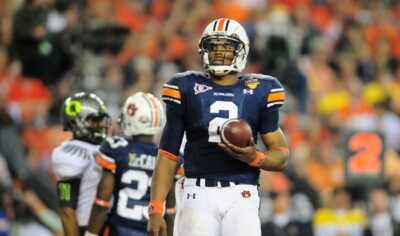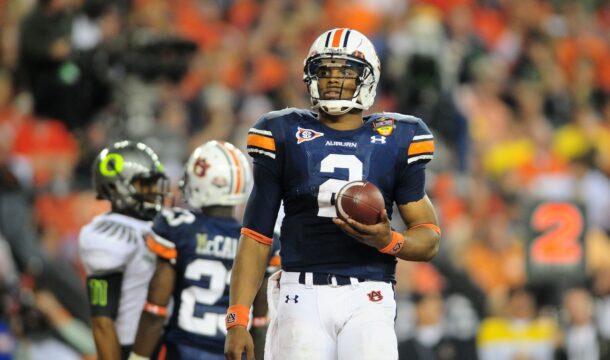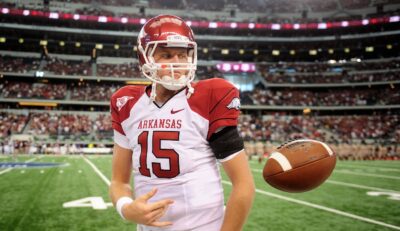
First and 10: Kirby Smart has Georgia believing it can take over college football
By Matt Hayes
Published:
1. I don’t want to get on a soapbox, but …
As hard as the moment was two years ago, as awful as it was running off a good man who won big but didn’t win big enough, this is what happens when you have the conviction to do what must be done.
You play for a national championship all of 25 months after the fact.
When Georgia fired Mark Richt after 145 wins in 15 seasons, after winning 74 percent of his games without NCAA problems and without bringing embarrassment on his university, it left this bar for the next coach: Winning 10 games a season isn’t good enough.
Kirby Smart then went out blew up those expectations.
In two years, Smart has spent one season redirecting the culture in the locker room (more on that later) and strengthening recruiting ties, and one season reaping the benefits from it. It’s that simple.
“It’s crazy how far we have come,” Georgia safety Dominick Sanders said.
This is what happens when you proactively look for solutions instead of reactively responding to problems. What happens when you take a hit for the good of the program (see: UGA athletic director Greg McGarity), and get publicly excoriated for it.
“A great day for the Bulldogs,” McGarity said after Georgia’s Rose Bowl win over Oklahoma.
And a great moment of redemption.
It was McGarity who saw the Georgia program getting stale under Richt, even though Richt was averaging 10 wins a game. It was McGarity who saw South Carolina angling for Smart and knew he had to make a move or lose the one guy he believed could change everything.
Two years later, Georgia is playing for it all and the Bulldogs just wrapped up an early National Signing Day so impressive (six 5-star recruits, including No. 1 overall QB Justin Fields), there little chance for anyone to catch them.
If Georgia beats Alabama Monday in the College Football Playoff National Championship Game, the Bulldogs will have won the national title and recruiting national title in two whirlwind years under Smart.
From a stale program spinning its wheels in 9- and 10 –win seasons (yes, that happens in the SEC), to the model for how to change coaches and win big on and off the field.
When Smart arrived in Athens, the groundwork was in place. Richt left a talented team and a cohesive locker room. Only one thing needed to change: the culture of winning.
“They were winning, but was is it enough? Do you want more?” Smart said. “They had to embrace the idea of really wanting more, and the sacrifice it takes to get there.”
It wasn’t easy in Year 1 – the 31-point loss to Ole Miss, the last-second loss to Tennessee, another loss to Florida and Georgia Tech – but that season of near-misses (three losses by a combined five points) allowed everyone at Georgia to realize what it took to go beyond what was comfortable and easy the previous two decades.
From a stale program spinning its wheels in 9- and 10 –win seasons (yes, that happens in the SEC), to the model for how to change coaches and win big on and off the field.
That’s how you respond in Year 2 to losing your starting quarterback on the first series of the first game of the season. Or how you respond to losing by 31 points to rival Auburn by doing the same to them in the SEC Championship Game rematch. Or how you respond to being down 17 in the Rose Bowl, and find a way to win in double overtime.
“To be honest, I don’t know if this team two years ago could’ve fought through that adversity and kept winning,” Georgia tailback Sony Michel said.
That’s why you suck it up, and rip off the Band-aid. Why you have the conviction to do what must be done.
2. What must be done, Part II
They didn’t plan this to happen, you know. Jacob Eason won the starting quarterback job in fall camp (barely), and the job was his and his alone.
Then he injured his knee in the first series of the Appalachian State game, and the entire season changed. Jake Fromm moved in, and Georgia moved on – and not just for the length of Eason’s injury.
Once Eason healed completely and could play – probably midway through the season – it was clear Fromm had taken control of the team. He was their quarterback, their leader, and a uniquely talented player who let nothing on the field or outside the program affect how he played.
Do you take a chance and go back to Eason because he earned the job before he got hurt, or do you move forward with Fromm, who was making huge strides week after week?

You do what has to be done – even if it means continue sitting a quarterback who won the job in fall camp, but has now lost it because of an injury.
“We got to a point where we had to make a decision,” Georgia offensive coordinator Jim Chaney said. “Jake was playing really well, and we just felt like we needed to stay with him. It’s not easy losing your job like that, but Jacob has been fantastic about it. I love him, love all these quarterbacks. They made my job, and this team’s job, a whole lot easier by the way the responded to change.
“It could have been a lot different. I’ve seen these deals where the quarterbacks don’t get along and it affects everything. The way you play, the way you prepare and the whole locker room. These two have been fantastic.”
3. What must be done, The Epilogue
Overlooked in this season of critical decisions were two made before it even began: tailbacks Nick Chubb and Michel returning for their senior seasons instead of leaving for the NFL.
In this age of bigger and faster players, and a career-ending injury only a play away, most elite running backs leave college after three years to save the wear and tear on their bodies.
The average career of an NFL running back is four years, and any extra time running backs stay in college is time they’re taking away from earning years in the NFL.
“I asked him if he was staying, he said yeah,” Michel said. “So I said, I’m staying, too. We wanted to be part of something special here.”
They’ve done just that.
In one memorable season, the senior tailbacks have combined to rush for 2,449 yards and 31 TDs, and are averaging 7.2 yards per carry. Chubb (205 carries) and Michel (142 carries) no doubt have taken tread off their NFL tires, but have also won an SEC Championship, won the Rose Bowl and put themselves in position to win the biggest game of all.
“It’s been great, the whole season has been worth it,” Chubb said. “But it’s not over.”
4. A big statement
Just when you thought Will Muschamp made the biggest noise of the season by somehow winning nine games with a South Carolina team that probably should’ve won six, along comes his post-Outback Bowl declaration.
Muschamp told his players in the postgame locker room after beating Michigan, “we’re going to win a championship.”
Don’t think it can’t happen – but also realize there are numerous obstacles in the way, beginning with the two SEC teams playing for the national title that keep getting better and recruiting better than everyone else.
South Carolina is also in desperate need of an offensive coordinator that can best take advantage of an elite quarterback (Jake Bentley) and wildly underrated skill players at both tailback and wide receiver. Those three positions must be pushed like never before.
But understand this: South Carolina, despite its limitations this season, played well in a 24-10 loss to Georgia. That doesn’t guarantee anything, but the Gamecocks continue to recruit well (Muschamp’s first two signing classes produced 26 starters) and a young team will only get better.
“We’ve just scratched the surface of what I think we can do,” Muschamp said.
5. The Weekly Five
The five best games of Week 1, 2018
- 1. Auburn vs. Washington (Atlanta)
- 2. LSU vs. Miami (Arlington, Texas)
- 3. Tennessee vs. West Virginia (Charlotte)
- 4. Alabama vs. Louisville (Orlando)
- 5. Ole Miss vs. Texas Tech (Houston)
6. The fire still burns
The critical question for Alabama in the CFP National Championship Game: Can the Tide continue to play with the disrespect chip on its shoulder?
I explained in detail last week why Alabama was the most dangerous team in the Playoff because it plays best when there’s doubt about its worthiness and ability to win big games.
That’s gone now after the emasculation of defending national champion Clemson in the Sugar Bowl. The bigger issue: Can that suffocating Alabama defense do it against a balanced offense?

Shutting down Clemson was a simple as eliminating the run game. Clemson quarterback Kelly Bryant isn’t nearly the passing threat that Deshaun Watson was, and the Tigers were quickly made one dimensional and ineffective.
But Georgia can throw on time and throw deep with accuracy. Fromm, wideouts Javon Wims and Terry Godwin, a deep group of tight ends and an offensive line that can protect will force the Tide to cover in the back end and not cheat safeties closer to the line of scrimmage in run support.
Alabama can’t simply sell out to stop the run without giving up potential big plays in the passing game. Oklahoma had to make similar choices in the Rose Bowl, and was repeatedly burned by the Georgia run game.
While Oklahoma’s defense clearly isn’t at the level of Alabama, the idea remains the same: The Tide have to stop the run without committing extra bodies in run support.
Georgia will win individual battles on the outside, and Fromm (23 TDs, 5 INT) won’t make game-turning mistakes in the passing game and has one interception in his last 133 passes dating to the Florida game.
7. Postseason blues
If one’s an anomaly and two’s a trend, three is a cause for concern at Auburn.
Not crazy, time to fire the coach concern. But enough where Gus Malzahn now has to think about how he prepares his team for the postseason.
Auburn is 0-3 in major bowls under Malzahn, losing the BCS National Championship Game (2013), the Sugar Bowl (2016) and the Peach Bowl earlier this week to UCF.
It doesn’t matter who Auburn is playing or how it got there, the Tigers have failed to play a complete game – and at times, have failed to compete. Like it or not, that all revolves around coaching during a month layoff.
It gets more concerning if you add in Auburn’s other two postseason appearances under Malzahn: an overtime loss to a Wisconsin team playing without its head coach (then-Badgers coach Gary Andersen), and the only bowl win (over Group of 5 school Memphis).
Malzahn admitted the Tigers “left too many points on the field” in the loss to FSU, and were clearly out-coached in losses to Oklahoma and UCF. More disconcerting: The Tigers looked overmatched on the line of scrimmage against a UCF defense that had given up 97 points in its previous two games against USF and Memphis – teams that run similar systems to Auburn.
That’s coaching. That’s getting a team ready to play in a game that might not mean anything in the grand scheme, but is critical for the growth of a program. Losing bowl games is losing offseason momentum, and don’t think that doesn’t impact players and programs for nine months of the year.
8. Ask and you shall receive
Hey Matt: Are you concerned that Mississippi State hired a coach with no real ties to the SEC. It’s a culture thing here, and if you don’t get it, you don’t get it. You get it?
Steven Swift, Jackson, Miss.
Steven: I think I get it. Let me paraphrase, if I may: Joe Moorhead doesn’t get the South. Guess what? I’m not buying it.
Coaching is coaching. Getting players in the best position to be successful is the most important thing any coach can do. Dan Mullen was from the Northeast and had spent all of four years in the SEC as Urban Meyer’s top assistant before he was hired by Mississippi State.
I’m guessing more than a few in Starkville and the state of Mississippi had reservations about Mullen succeeding. All he did was change the entire value of the program.
Joe Moorhead is a ball coach; a true grinder who loves the game and finding ways to beat the other guy. Moorhead had zero Big Ten experience, and he completely changed the Penn State offense (and recruited well, too).
The idea of culture fit is overrated. I want a coach who knows Xs and Os, who knows how to treat people and has good people skills, and who knows how to motivate. You’ve got 3-for-3 in Moorhead. Enjoy the ride.
9. Numbers game
7.7: The average yards per carry from big and physical Oklahoma tailback Rodney Anderson in the Rose Bowl. Anderson had 201 yards on 26 carries, and the Georgia defense now must stop Alabama’s big, physical tailbacks Damien Harris and Bo Scarbrough.
Anderson did much of his damage on inside zone power runs with the quarterback in the shotgun position, the very thing that the Alabama offense has moved more toward over the past two or three seasons.
Auburn hurt Georgia with the same inside zone run over and over in the first meeting between the teams in November. Clearly, it’s an issue for the Georgia defense – and one that can be exposed in the championship game.
10. Quote to note
L.A. Rams running back and former Georgia tailback Todd Gurley in the Bulldogs’ locker room after the Rose Bowl: “It’s the southern Super Bowl in Atlanta. What more could you ask for? That’s why you play in the SEC, to play in these big games.”
Matt Hayes is a national college football writer for Saturday Down South. You can hear him daily from 12-3 p.m. on 1010XL in Jacksonville. Follow on Twitter @MattHayesCFB







